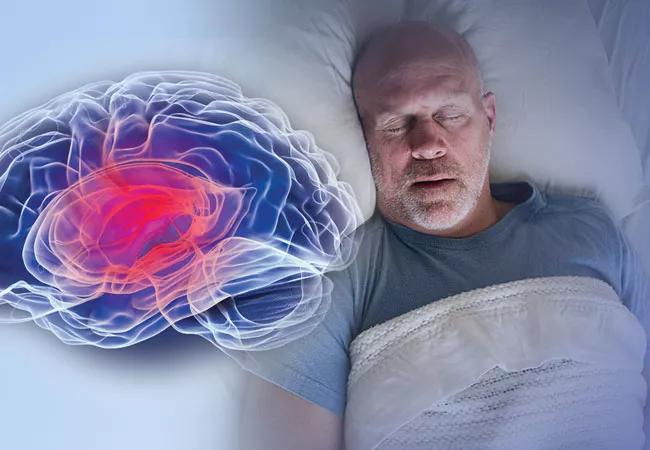New insights into shared inflammatory pathways and immune responses

Circadian rhythm irregularities and sleep disturbances in patients with Alzheimer’s disease with mild cognitive impairment (MCI-AD) are associated with changes in biomarkers of immunity and inflammation, according to a preliminary analysis published in the Journal of Alzheimer’s Disease.
Advertisement
Cleveland Clinic is a non-profit academic medical center. Advertising on our site helps support our mission. We do not endorse non-Cleveland Clinic products or services. Policy
The first-of-its-kind study is part of a Cleveland Clinic research team’s multifaceted slate of investigations into the role of inflammation and immunity in the development of AD. Their longitudinal clinical study has demonstrated that cognitive and functional decline during the MCI stage of AD is impacted by key pro-inflammatory changes in baseline levels of immune cell chemotactic cytokine CCL-2 in the cerebrospinal fluid (CSF) and by IL-10 pathway dysregulation.
“Working with our colleagues in the Sleep Disorders Center, we sought to discover whether the sleep disturbances long associated with AD shared some of the inflammatory pathways and innate immune changes that have been identified as critical in cognitive and functional decline in the disease,” says the study’s lead author, Jagan Pillai, MD, PhD, of Cleveland Clinic Lou Ruvo Center for Brain Health.
Parsing out the pathways could present an opportunity to identify potential targets for intervention, even in the preclinical stage of the disease. “The challenge our team faced was developing an analytical approach that allowed simultaneous evaluation of multiple analytes while investigating their clinical significance when expressed together in plasma and CSF,” says Reena Mehra, MD, MS, senior author and Director of Sleep Disorders Research in Cleveland Clinic’s Neurological Institute. “This approach allows us a broader understanding of the impact of biomarkers in two different domains on disease progression.”
The researchers conducted a preliminary examination of CSF and plasma biomarkers in a cohort of patients with MCI plus CSF biomarkers consistent with AD (MCI-AD; further clinical characterization was previously published in the Annals of Clinical Translational Neurology [2019;6:1248-1262]). Patients had circadian and sleep rhythm phenotyping performed via actigraphy and home sleep apnea testing. CSF and plasma samples were collected along with Mini-Mental State Examination and Clinical Dementia Rating scale results.
Advertisement
For 10 days, patients wore a wrist accelerometer that measured temperature, activity and ambient light. The researchers examined circadian measures including the F-ratio, amplitude, mesor, acrophase, circadian variability and various sleep-wake variables. They used linear models to examine a total of 11 circadian/sleep measures along with 69 CSF or circulating biomarkers of neurodegeneration, inflammation and immunity. The analytic sample included 18 patients with a median age of 69.5 years (interquartile range, 64.0 to 72.0).
The researchers found that circadian disruption was associated with altered humoral immune responses in the CSF and plasma as well as an increase in the CSF neurodegenerative biomarkers p-tau and t-tau.
Sleep disruption, on the other hand, was more associated with abnormalities in circulating plasma markers of inflammation and immunity but not with neurodegeneration biomarkers. Greater cognitive decline accompanied sleep disruption in these patients.
“We found both complementary and distinctive relationships between circadian and sleep disruptions and biomarkers of immunity and inflammation,” says Dr. Mehra. “Taken together, this suggests that circadian and sleep disruptions play both interdependent and independent roles in AD pathophysiology.”
The study findings confirm that symptomatic MCI-AD patients with abnormal circadian measures are in a state of immune activation and experiencing dysregulated circadian neurodegeneration, and that sleep disruption promotes negative cognitive outcomes.
Advertisement
“While this is a hypothesis-generating study, it is a step in the direction of harnessing what we know about the relationships between sleep, inflammation and AD to identify risk biomarkers or therapeutic targets that may allow us to interrupt AD pathophysiology and cognitive decline,” says Dr. Mehra.
Investigative efforts by Drs. Pillai, Mehra and colleagues are underway to shed additional light on the biology underlying these findings.
Advertisement
Advertisement

An argument for clarifying the nomenclature

An expert talks through the benefits, limits and unresolved questions of an evolving technology

Recommendations on identifying and managing neurodevelopmental and related challenges

Phase 2 trials investigate sitagliptin and methimazole as adjuvant therapies

Aim is for use with clinician oversight to make screening safer and more efficient

Rapid innovation is shaping the deep brain stimulation landscape

Study shows short-term behavioral training can yield objective and subjective gains

How we’re efficiently educating patients and care partners about treatment goals, logistics, risks and benefits